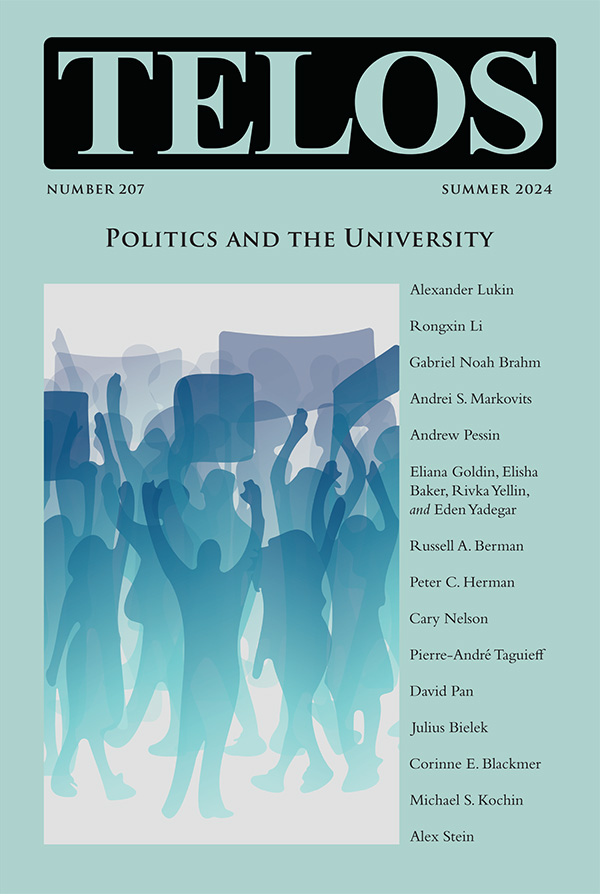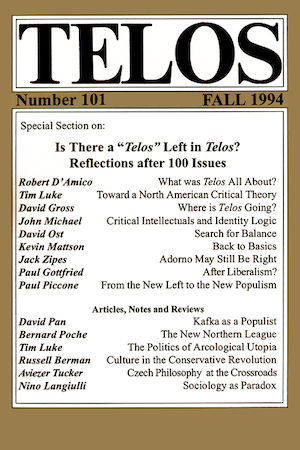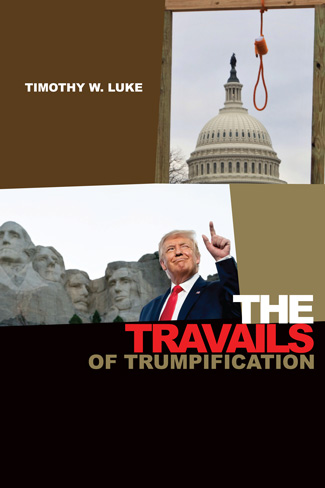By David Pan · Friday, July 12, 2024 Telos 207 (Summer 2024): Politics and the University is now available for purchase in our store. Individual subscriptions to Telos are also available in both print and online formats.
 There is a fundamental arbitrariness about the work that is done at colleges and universities, which stems from the relationship between academic work and the political parameters of this work. The key issue is that the most basic aspect of our humanity involves having a sense of right and wrong. This sense of values sets the framework for all our other thoughts, actions, and decisions, providing direction and meaning for our lives. There is a fundamental arbitrariness about the work that is done at colleges and universities, which stems from the relationship between academic work and the political parameters of this work. The key issue is that the most basic aspect of our humanity involves having a sense of right and wrong. This sense of values sets the framework for all our other thoughts, actions, and decisions, providing direction and meaning for our lives.
The feeling that we are doing the right thing can motivate us to great achievements, and the loss of that feeling can lead us into inescapable despair. At the same time, when we perceive that others are doing wrong, we have a feeling of indignation at such injustice and seek to redress it. We will also judge the wrong doer in the same harsh light that we might use against ourselves when we fail to live up to our own ideals. Consequently, our sense of values will color all our perceptions and determine our decisions and judgments.
Continue reading →
By Florindo Volpacchio · Wednesday, December 28, 2022 If a journal manages to survive for 100 issues, it is reasonable to assume that the editorial board has managed to reach some sort of internal consensus and can finally rest on its laurels. Such is not the case with Telos. . . . After all these years, nothing seems to be settled and [Telos] remains a hopelessly heterogeneous group still trying to come to some agreement concerning many crucial and not-so-crucial issues. . . . This is why this theoretical bellum omnium contra omnes may be interpreted as evidence of lingering internal vitality, an unwillingness to take anything for granted, and a suspicion of all positions even faintly resembling conformism and passivity.
 With those words from Telos 101 (Fall 1994), Paul Piccone launched his critique of those who felt Telos had lost its direction and had settled into the role of the cranky old uncle of intellectual journals. Having just celebrated its 200th issue in its 54th year, those words still speak to the current state of the intellectual project he launched back in 1968. With those words from Telos 101 (Fall 1994), Paul Piccone launched his critique of those who felt Telos had lost its direction and had settled into the role of the cranky old uncle of intellectual journals. Having just celebrated its 200th issue in its 54th year, those words still speak to the current state of the intellectual project he launched back in 1968.
Piccone’s critique of his critics, “From the New Left to the New Populism,” was intended not to lay claim to any settled doctrine for Telos but to demonstrate the journal’s ability to constantly rethink its position among current debates along the entire ideological spectrum. While the bellum omnium contra omnes Piccone refers to in his article specifically refers to Telos‘s own family, I think it is more than fair to say it was applied to any and all who asserted a suspicious and artificial ground for emancipation. Toward this end, Piccone begins by providing his own critique of the Western Marxist tradition out of which Telos arose. This in itself, in its pure compactness, is a tour de force of intellectual history and should be read by all those who seek an origin story, or who simply need to have their revision revised.
Continue reading →
By Telos Press · Tuesday, May 3, 2022 In his new book, The Travails of Trumpification, a series of critical essays written over the course of Donald J. Trump's presidency, Timothy W. Luke explores how the recent twists and turns in the civic life of the United States have precipitated a dangerous transformation of American political culture. Tim recently talked with Mark S. Weiner about the book and the current precarious state of U.S. politics.
Continue reading →
By Telos Press · Tuesday, December 28, 2021 Today’s episode of the Telos Press Podcast features a panel discussion of Timothy W. Luke’s new book, The Travails of Trumpification, published earlier this month by Telos Press. The discussion, in which Tim is joined by David Pan, Fred Siegel, and Mark S. Weiner, covers a range of topics and questions, including the meaning and origins of “Trumpification”; Trump’s contempt for democratic liberal norms; the emergence of a progressive habitus in the early twentieth century; the critique of liberal managerialism; the rhetoric of the “forgotten little guy” (à la Rodney Dangerfield); the purposeful use of ignorance to send up the degreed classes; the extent to which Trump emerged out of “Nixonland”; Trump’s undermining of the claims of scientific truth; the relationship of science to political interest, and how each should inform the other; the populist attack on the New Class; Trump’s elevation of individual winning over larger collective interests and the public good; the weakening of a rationalist epistemology on which democracy depends in favor of an ethos of pure power; how the Afghanistan withdrawal and the coronavirus pandemic exacerbated the public’s disdain for expertise; and how power might be shifted from the administrative state to the local level as a way of integrating all members of the public in political decision-making and thereby revitalizing citizenship. Timothy W. Luke’s The Travails of Trumpification is now available in our online store, where you can save 20% off the list price by using the coupon code BOOKS20.
Listen to the podcast here.
Continue reading →
By Russell A. Berman · Wednesday, December 8, 2021 The stunning end to the twenty-year war in Afghanistan with an unambiguous defeat has had little consequences in American domestic politics. To be sure, the final rout may have contributed to President Biden’s decline in public opinion polls, but there are plenty of other reasons for that. The end of the Afghanistan War, surely a matter of historical import, just disappeared into the news cycle. After the lives lost, the resources wasted, and the ideals betrayed, one might expect the political class to pay attention and to demand accountability. Yet no one seems to notice.
Such an accounting could take the form, for example, of congressional hearings—but instead Congress prefers to rehash the sad political circus of the January 6 riot. It has no time for the two decades in Afghanistan, telling evidence of our legislators’ priorities. Instead of congressional hearings, a special commission might be convened, serious and bipartisan, such as the one that followed on 9/11. No one is taking this road either. Enormous expenditure of resources and a defeat clearer even than the exit from Vietnam, and Washington doesn’t care.
Continue reading →
By Telos Press · Wednesday, December 1, 2021 Now available from Telos Press: The Travails of Trumpification, by Timothy W. Luke. Order the paperback edition today in our online store and save 20% by using the coupon code BOOKS20. Also available in Kindle ebook format at Amazon.com.
The Travails of Trumpification
by Timothy W. Luke
 Telos Press Publishing is delighted to announce the release of Timothy W. Luke’s new book, The Travails of Trumpification. In this series of critical essays written over the course of Donald J. Trump’s presidency, from its chaotic early days to its calamitous end, Luke explores how the recent twists and turns in the civic life of the United States have precipitated a dangerous transformation of American political culture. Since 2016, Trump’s will to attain, and then retain, his office by whatever means necessary crossed red lines never before violated by any previous presidential administration. Even before his loss in the 2020 election, Trump sought to discredit America’s electoral process by challenging legal voting practices in key swing states on social media, in the courts, through executive agencies, and finally with violent riots, culminating in the disastrous attack on the U.S. Capitol on January 6, 2021. Yet while Trump himself no longer remains president, the “Trumpification” of the American political system persists today, with the majority of Republican politicians as well as Trump’s millions of devoted followers still firmly in the grip of his influence. The goal of the critical probes collected in this volume is to evaluate the “travails,” or excessive tribulation, pain, hardship, anguish, and agony, that his dangerous demagoguery has inflicted—and continues to inflict—on the nation’s democratic institutions and processes. Telos Press Publishing is delighted to announce the release of Timothy W. Luke’s new book, The Travails of Trumpification. In this series of critical essays written over the course of Donald J. Trump’s presidency, from its chaotic early days to its calamitous end, Luke explores how the recent twists and turns in the civic life of the United States have precipitated a dangerous transformation of American political culture. Since 2016, Trump’s will to attain, and then retain, his office by whatever means necessary crossed red lines never before violated by any previous presidential administration. Even before his loss in the 2020 election, Trump sought to discredit America’s electoral process by challenging legal voting practices in key swing states on social media, in the courts, through executive agencies, and finally with violent riots, culminating in the disastrous attack on the U.S. Capitol on January 6, 2021. Yet while Trump himself no longer remains president, the “Trumpification” of the American political system persists today, with the majority of Republican politicians as well as Trump’s millions of devoted followers still firmly in the grip of his influence. The goal of the critical probes collected in this volume is to evaluate the “travails,” or excessive tribulation, pain, hardship, anguish, and agony, that his dangerous demagoguery has inflicted—and continues to inflict—on the nation’s democratic institutions and processes.
Continue reading →
|
|
 There is a fundamental arbitrariness about the work that is done at colleges and universities, which stems from the relationship between academic work and the political parameters of this work. The key issue is that the most basic aspect of our humanity involves having a sense of right and wrong. This sense of values sets the framework for all our other thoughts, actions, and decisions, providing direction and meaning for our lives.
There is a fundamental arbitrariness about the work that is done at colleges and universities, which stems from the relationship between academic work and the political parameters of this work. The key issue is that the most basic aspect of our humanity involves having a sense of right and wrong. This sense of values sets the framework for all our other thoughts, actions, and decisions, providing direction and meaning for our lives. 



